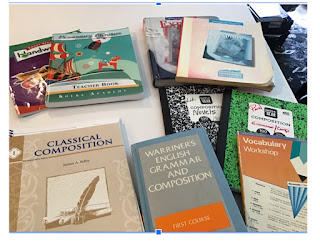I’ve advised a few new home-schooling families—usually with back-up from veteran families. I lean on my teacher experience. I’ve only home-schooled a little. But I have loads of teacher experience. My advice is to focus on the basics the first year—or at least the first term. There are loads of Curriculum. Make your focus on math, History, English, and Science.
Start with Saxon Math. Here is a scope and sequence to help with planning. Plan to do math every day. If your child struggles, use the previous year. It’s more important to master math than to be on grade-level.
Bob Jones University’s Heritage series is popular. History really depends on your faith. The Catholic Textbook Project has textbooks for grades 4-high school. We use Light to the Nation I and II with Lacie in high school because the format worked for her. You’ll need the teacher’s manual, textbook, and student notebook. Catholic Textbook’s provide digital versions of the test with answer keys for the workbook, quizzes, and tests. Plan to do one chapter each week. Read the chapter and complete the workbook pages. Take the quizzes and test.
Younger children might take Daily Geography Practice in lieu of history. You might want to try Even-Moor’s History Pockets. Younger kiddos need to spend time reading and learning math facts. Keep History light.
We enrolled Paul at Kolbe Academy online. Below are his English books. For many families new to home-schooling this is a recipe for disaster. Instead, use Kolbe’s Elementary or Primary Literature Manual. Start with four books. These are classics. Reading these books, fables, and stories will elevate English. Answer questions in a notebook. Write a book report. Here is a simple template. Practice handwriting by answering questions in complete sentences in the notebook. Make a list of new vocabulary words and look them up in the dictionary. Bonus points for weekly spelling tests of these vocab words! Postpone Easy Grammar and readers, or Classical Composition until you have a good system going with your school lessons.
What about science? I love Apologia’s Young Explorers’ Series. You need the textbook and student notebook. The syllabus is in the student notebook. These books are widely available used. The series has loads of hands-on activities. These books are great for kids in grades 1-6. You can finish one book in a year.
We used Hartcourt Science when we home-schooled Paul. This is more academic. There is a little lab in the book. I supplemented with labs and projects. Full disclosure—I’m a high school Biology and Chemistry teacher.How long does this take? Most home-school families focus on about three hours of lessons in the morning. We started lessons right after breakfast, usually around 8:30. Math included problems, a check of the answers, and corrections. Include time to read the history and English lessons. Plan a lab or hands-on activity each week. If you use the Young Explorers series, there are several, fun activities in each chapter. Here is a sample. Turn ahead to see a Try This! Do all four subjects everyday. You’ll have time for Bible or Catechesis lessons, too. Remember, you want to succeed as a home-schooler. Don’t sabotage your efforts by including so many materials you find yourself overwhelmed.













No comments:
Post a Comment